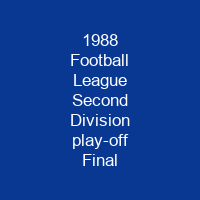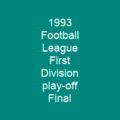The 1988 Football League Second Division play-off Final was contested between Chelsea and Middlesbrough over two legs on 25 May 1988 and 28 May 1988. It was to determine which club would play the next season in the First Division, the top tier of English football. Chelsea won the match 1–0, but lost the tie 2–1 on aggregate. Chelsea were later found guilty of failing to control their supporters and fined £75,000. The match was worth £1million to the promoted club through increases in matchday, commercial and broadcasting income.
About 1988 Football League Second Division play-off Final in brief

Security fences were erected, often topped with barbed wire, to keep fans apart and off the pitch. Although this resulted in reduced violence at football games, it helped foster a collective identity for the groups of supporters, which often just shifted the violence out of the stadium into the nearby streets. By the mid-1960s, football hoolsiganism was considered a national problem which affected the image of England overseas, and local and national government intervened to tackle the problem rather than leave it to the football authorities. In 1987, the Football League introduced play-offs to add excitement to the end of the season, giving more teams something to compete for, while also generating more money for those clubs involved. The bottom three clubs from the First division were automatically relegated, while the fourth from bottom entered the play-ups. The top two clubs in the Second division gained automatic promotion, and the teams finishing in third to fifth competed in theplay-offs. Chelsea had been Second Division champions in the 1983–84 season, and had played in the first Division for the four seasons since. After the final whistle, a few hundred Chelsea fans broke onto the pitch and threw projectiles at the visiting supporters, and 45 people were injured, including 25 police officers. In total, 102 arrests were made, and Chelsea were given a £ 75,000 fine and had to close their terraces for the first six matches of the subsequent season.
You want to know more about 1988 Football League Second Division play-off Final?
This page is based on the article 1988 Football League Second Division play-off Final published in Wikipedia (as of Dec. 07, 2020) and was automatically summarized using artificial intelligence.







